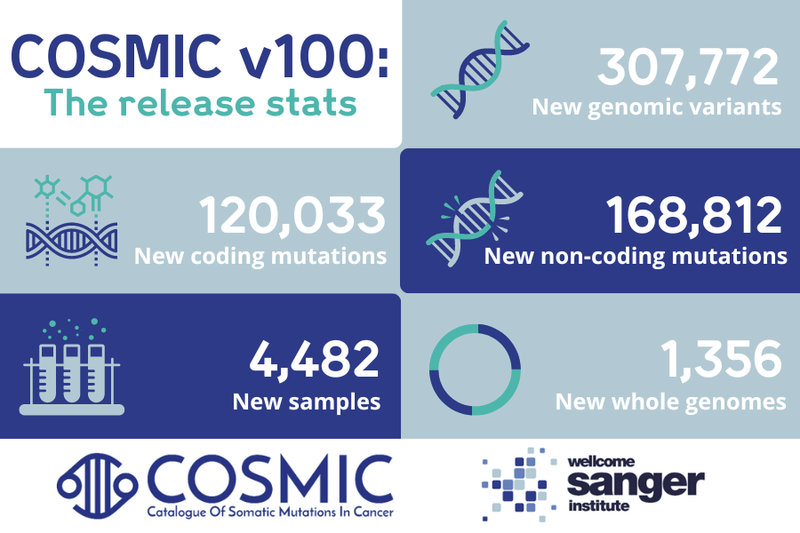Largest genomic cancer resource accelerating research and drug development
21 May 2024
Press Release
COSMIC has released the 100th version of its knowledgebase, containing further information on 300,000 somatic mutations linked to human cancers.
Wellcome Trust Genome Campus, Hinxton, Saffron Walden 21/05/24 - The world’s largest and most comprehensive resource for genetic mutations relating to human cancers, COSMIC (Catalogue of Somatic Mutations in Cancer), launches its 100th version today (21 May).
Version 100 (v100) is a compilation of two decades of work, containing over 307,000 newly added genomic variants, taking the overall number to more than 24 million.
COSMIC, based at the Wellcome Sanger Institute, collates worldwide cancer genomic data to produce a gold-standard, accessible knowledgebase that can be used to explore new potential therapeutic targets and characterise a cancer’s mutational landscape.
This latest version, released during COSMIC’s 20th anniversary year, includes novel mutations from 4,482 tumour samples, with a particular focus on the role of BRAF and RAS genes in cancer. Additionally, v100 will include the brand new collection: Experimental Signatures. This collection gives users the opportunity to observe the patterns of mutations resulting from different exposures across species, including model organisms.
Even though the journey to a full genetic understanding of cancer and its origins is ongoing, v100 is a testament to how COSMIC leaves no stone unturned in its mission for a comprehensive and evolving knowledgebase1. V100 and the understanding it brings also highlights new paths to personalised cancer treatments, building a map towards this next era of medicine.
COSMIC was launched in 2004 by Professor Sir Mike Stratton and his team at the Sanger Institute and now has over 37,000 active users worldwide.
COSMIC is unique in its structure and approach, combining both semi-automatic data annotation with manual curation, ensuring that both wide-scale and in-depth genomic information is collected. To ensure a consistently high standard, all data curated by COSMIC go through a rigorous quality control process carried out by a team of expert curators.
Karen McLaren, Head of Product and Delivery at COSMIC, said: “The most important aspect of the COSMIC knowledgebase is the users and how the data and insights boost their research, discoveries, and advancements in oncology. While we tackle the exponential growth of genomic data, we continue to work closely with users to optimise how they prioritise and access their data of interest. The interactions with our users are integral to our product development as their needs are the core drivers for our innovation and growth. We have phenomenal foundations and building on these in the years ahead is going to be an exciting journey.”
COSMIC provides multiple resources that collectively help advance our understanding of cancer biology, facilitate traditional research, and improve clinical management strategies for patients.
Ilaria Fasanella, Head of Commercial at COSMIC, said: “COSMIC is a completely agnostic resource with a user base that spans academia and the biotechnology and pharmaceutical industry, both within research and diagnostics. This puts COSMIC at the centre of the knowledge loop between key stakeholders in the somatic oncology ecosystem at present, and for decades to come. In recent years, our forward-looking hybrid business model has allowed us to become self-sustaining, while keeping access to our data free for academic users. We continuously forge new collaborations and partnerships, allowing us to develop COSMIC and adapt to the growing needs of the community it serves.”
Past, present, and future COSMIC datasets can be applied to:
- Identify cancer driver mutations.
- Characterise the mutational landscape of specific cancer types and tumours.
- Explore known and potential therapeutic targets.
- Discover and validate biomarkers associated with cancer prognosis, treatment response and patient outcomes.
- Drug sensitivity and resistance studies to gain insight into genetic factors behind the results.
- Genomic epidemiology to help study how genetic factors influence human health and disease.
Dr Gianmarco Contino, Head of c-StAR lab, Associate Professor of Cancer Genomic Medicine and Consultant Upper GI Surgeon at the University of Birmingham, said “On a daily basis, the COSMIC catalogue is the place to go if you want to check that a mutation found in a sample or a cohort of patients have been found in other cancers, or whether, for example, a gene is altered through other mechanisms such as copy number alterations or structural variants. It's really the “Yellow Pages” of somatic mutations.”
Jon Teague, Director of COSMIC, said: “For twenty years, COSMIC’s mission has been to develop and maintain gold-standard mutation data resources and enable rapid access for scientists and clinicians to advance knowledge and improve cancer outcomes. With the phenomenal increase of available genomic biodata, our mission has never been more important to help ensure big data benefits human health. Our multidisciplinary team of experts and proven ability to work at scale uniquely place COSMIC as a long-term sustainable bioinformatics resource that champions data standards and the principles of findability, accessibility, interoperability, and reusability.”

